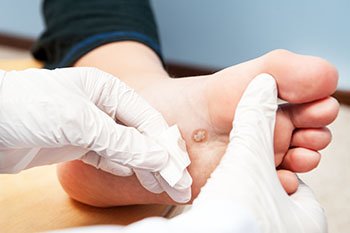Connect With Us
Blog
 Ingrown toenails occur when the nail grows into the skin instead of over it, often the result of improper nail trimming, tight footwear, or injury. Ingrown toenails are common in children, as well as adults. The condition can cause pain, redness, and swelling around the child’s toe. If not treated properly, it can lead to infection. Especially for children, treatment typically begins conservatively, using methods such as soaking the affected foot in warm, soapy water to soften the nail and relieve pain. A podiatrist, or foot doctor, may try lifting the edge of the ingrown nail and placing a small amount of cotton underneath it to help guide the nail to grow above the skin. I is important for children to wear properly fitting shoes and to have their toenails trimmed straight across instead of rounded. This can help prevent the recurrence of ingrown toenails. If conservative treatments fail or if the ingrown toenail recurs frequently, a podiatrist may perform a minor procedure to remove part of the nail. They may treat the nail bed to prevent further issues, if necessary. This approach helps alleviate discomfort and prevent potential complications. If your child is suffering with an ingrown toenail, it is suggested you schedule an appointment with a podiatrist for prompt treatment.
Ingrown toenails occur when the nail grows into the skin instead of over it, often the result of improper nail trimming, tight footwear, or injury. Ingrown toenails are common in children, as well as adults. The condition can cause pain, redness, and swelling around the child’s toe. If not treated properly, it can lead to infection. Especially for children, treatment typically begins conservatively, using methods such as soaking the affected foot in warm, soapy water to soften the nail and relieve pain. A podiatrist, or foot doctor, may try lifting the edge of the ingrown nail and placing a small amount of cotton underneath it to help guide the nail to grow above the skin. I is important for children to wear properly fitting shoes and to have their toenails trimmed straight across instead of rounded. This can help prevent the recurrence of ingrown toenails. If conservative treatments fail or if the ingrown toenail recurs frequently, a podiatrist may perform a minor procedure to remove part of the nail. They may treat the nail bed to prevent further issues, if necessary. This approach helps alleviate discomfort and prevent potential complications. If your child is suffering with an ingrown toenail, it is suggested you schedule an appointment with a podiatrist for prompt treatment.
Ingrown toenails may initially present themselves as a minor discomfort, but they may progress into an infection in the skin without proper treatment. For more information about ingrown toenails, contact one of our podiatrists of Podiatry Care Specialists. Our doctors can provide the care you need to keep you pain-free and on your feet.
Ingrown Toenails
Ingrown toenails are caused when the corner or side of a toenail grows into the soft flesh surrounding it. They often result in redness, swelling, pain, and in some cases, infection. This condition typically affects the big toe and may recur if it is not treated properly.
Causes
- Improper toenail trimming
- Genetics
- Improper shoe fitting
- Injury from pedicures or nail picking
- Abnormal gait
- Poor hygiene
You are more likely to develop an ingrown toenail if you are obese, have diabetes, arthritis, or have any fungal infection in your nails. Additionally, people who have foot or toe deformities are at a higher risk of developing an ingrown toenail.
Symptoms
Some symptoms of ingrown toenails are redness, swelling, and pain. In rare cases, there may be a yellowish drainage coming from the nail.
Treatment
Ignoring an ingrown toenail can have serious complications. Infections of the nail border can progress to a deeper soft-tissue infection, which can then turn into a bone infection. You should always speak with your podiatrist if you suspect you have an ingrown toenail, especially if you have diabetes or poor circulation.
If you have any questions, please feel free to contact our offices located in West Chester, and Broomall, PA . We offer the newest diagnostic and treatment technologies for all your foot care needs.

Diabetic foot ulcers pose a serious risk to those with diabetes, often flying under the radar until they become severe. The condition arises due to poor blood circulation and nerve damage, making it less likely for individuals to notice when their feet are injured. These ulcers typically occur on the soles of the feet or pressure points like the heels and toes, where friction and pressure are high. After a podiatrist removes dead tissue and cleanses the affected area, it is important to keep weight off the foot to prevent further complications and promote healing. Prevention is key, involving daily foot inspections, proper footwear, regular foot hygiene, and blood sugar management. Consulting a podiatrist is essential for diabetic patients to receive specialized care and guidance in preventing and managing foot ulcers. With their expertise, individuals can better safeguard their feet and overall well-being, avoiding the potentially devastating consequences of diabetic foot ulcers. If you have diabetes, it is strongly suggested that you add a podiatrist to your healthcare team.
Wound care is an important part in dealing with diabetes. If you have diabetes and a foot wound or would like more information about wound care for diabetics, consult with one of our podiatrists from Podiatry Care Specialists. Our doctors will assess your condition and provide you with quality foot and ankle treatment.
What Is Wound Care?
Wound care is the practice of taking proper care of a wound. This can range from the smallest to the largest of wounds. While everyone can benefit from proper wound care, it is much more important for diabetics. Diabetics often suffer from poor blood circulation which causes wounds to heal much slower than they would in a non-diabetic.
What Is the Importance of Wound Care?
While it may not seem apparent with small ulcers on the foot, for diabetics, any size ulcer can become infected. Diabetics often also suffer from neuropathy, or nerve loss. This means they might not even feel when they have an ulcer on their foot. If the wound becomes severely infected, amputation may be necessary. Therefore, it is of the upmost importance to properly care for any and all foot wounds.
How to Care for Wounds
The best way to care for foot wounds is to prevent them. For diabetics, this means daily inspections of the feet for any signs of abnormalities or ulcers. It is also recommended to see a podiatrist several times a year for a foot inspection. If you do have an ulcer, run the wound under water to clear dirt from the wound; then apply antibiotic ointment to the wound and cover with a bandage. Bandages should be changed daily and keeping pressure off the wound is smart. It is advised to see a podiatrist, who can keep an eye on it.
If you have any questions, please feel free to contact our offices located in West Chester, and Broomall, PA . We offer the newest diagnostic and treatment technologies for all your foot care needs.

Plantar warts, caused by the human papillomavirus, or HPV, are skin growths appearing on the soles of the feet, often transmitted in warm, moist environments. Though generally harmless, they can cause discomfort and resemble different problems, necessitating careful diagnosis. Treatments vary from conservative remedies to professional interventions like salicylic acid, cryotherapy, or surgery, with responses varying among individuals. Given their contagious nature, prompt treatment is advised to prevent spread. Differential diagnosis is vital to rule out more serious conditions like melanoma. Consulting a podiatrist ensures accurate identification and tailored treatment. Their expertise in foot health management, including the effective removal of plantar warts, promotes overall well-being. If you suspect plantar warts or experience foot discomfort, it is suggested that you seek professional evaluation and treatment from a podiatrist for the best outcome.
Plantar warts can be very uncomfortable. If you need your feet checked, contact one of our podiatrists from Podiatry Care Specialists. Our doctors will assist you with all of your foot and ankle needs.
About Plantar Warts
Plantar warts are the result of HPV, or human papillomavirus, getting into open wounds on the feet. They are mostly found on the heels or balls of the feet.
While plantar warts are generally harmless, those experiencing excessive pain or those suffering from diabetes or a compromised immune system require immediate medical care. Plantar warts are easily diagnosed, usually through scraping off a bit of rough skin or by getting a biopsy.
Symptoms
- Lesions on the bottom of your feet, usually rough and grainy
- Hard or thick callused spots
- Wart seeds, which are small clotted blood vessels that look like little black spots
- Pain, discomfort, or tenderness of your feet when walking or standing
Treatment
- Freezing
- Electric tool removal
- Laser Treatment
- Topical Creams (prescription only)
- Over-the-counter medications
To help prevent developing plantar warts, avoid walking barefoot over abrasive surfaces that can cause cuts or wounds for HPV to get into. Avoiding direct contact with other warts, as well as not picking or rubbing existing warts, can help prevent the further spread of plantar warts. However, if you think you have developed plantar warts, speak to your podiatrist. He or she can diagnose the warts on your feet and recommend the appropriate treatment options.
If you have any questions please feel free to contact our offices located in West Chester, and Broomall, PA . We offer the newest diagnostic and treatment technologies for all your foot and ankle needs.

